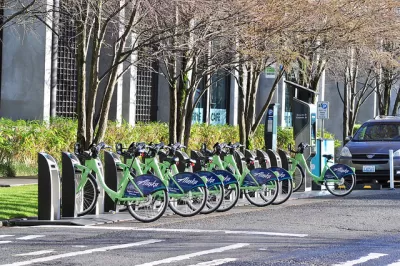Planners have gathered in Seattle to enjoy the city. The city's bikeshare system is also enjoying the planners.

Pronto! Cycle Share reported record ridership numbers for its system on April 18, 2015—the same date as the commencement of the APA National Conference in Seattle.
The strong ridership trend continues on April 19, as eyewitness accounts by local bloggers at The Urbanist confirmed empty bike share stations at the station location nearest to the Convention Center.
The bikeshare station near my hotel, a few blocks away from the convention center, was also empty yesterday all afternoon and into the early evening.
Pronto! allowed the speculation (via Twitter) that planners were in part responsible for the uptick in ridership—the system also completed its #ProntoWeek membership drive last week.
To end any doubt about the dramatic impact of 6,400 urban experience-minded planners descending on a city, the intrepid bloggers at The Urbanist also crunched the numbers at a UCL CASA bikeshare map created by Oliver O'Brien, finding that the bikeshare stations nearest the Convention Center were the busiest in the entire system over the 24 hours that set the system record.
The achievement is worthy of kudos to the Seattle bikeshare system, but also to the changing culture of planners from around the country. It's a simple matter of leading by example, given that the benefits of biking to the environment, traffic safety, and the local economy are well established. Hopefully this example can also help make the case for planners working to expand bikeshare options in downtown tourists districts and everywhere else.
If you're interested in checking in on the status of the Pronto! system throughout the final full day of the conference, check the real time station information map.

Planetizen Federal Action Tracker
A weekly monitor of how Trump’s orders and actions are impacting planners and planning in America.

Congressman Proposes Bill to Rename DC Metro “Trump Train”
The Make Autorail Great Again Act would withhold federal funding to the system until the Washington Metropolitan Area Transit Authority (WMATA), rebrands as the Washington Metropolitan Authority for Greater Access (WMAGA).

The Simple Legislative Tool Transforming Vacant Downtowns
In California, Michigan and Georgia, an easy win is bringing dollars — and delight — back to city centers.

Demise of Entertainment Industry Mirrors Demise of Housing in LA
Making movies has a lot in common with developing real estate: producers = developers; screenwriters = architects; directors = general contractors. The similarities are more than trivial. Both industries are now hurting in L.A.

How Public Spaces Exclude Teen Girls
Adolescent girls face unique challenges and concerns when navigating public spaces. We can design cities with their needs in mind.

Proposed Ohio Budget Preserves Housing Trust Fund
The Senate-approved budget also creates two new programs aimed at encouraging housing construction.
Urban Design for Planners 1: Software Tools
This six-course series explores essential urban design concepts using open source software and equips planners with the tools they need to participate fully in the urban design process.
Planning for Universal Design
Learn the tools for implementing Universal Design in planning regulations.
Smith Gee Studio
City of Charlotte
City of Camden Redevelopment Agency
City of Astoria
Transportation Research & Education Center (TREC) at Portland State University
US High Speed Rail Association
City of Camden Redevelopment Agency
Municipality of Princeton (NJ)




























